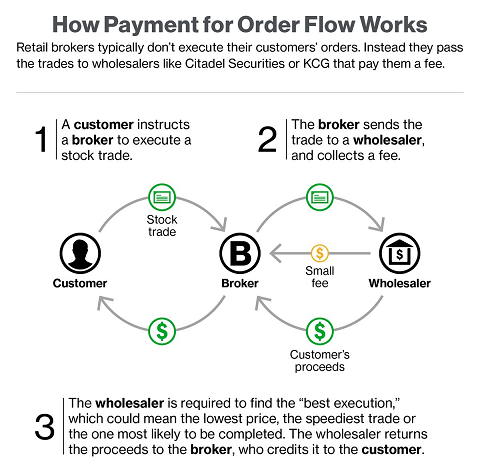Payment for order flow & Robinhood
How does payment for order flow impact retail investors and is Robinhood really free?

Why I am writing this article
Robinhood makes most of its money from payment for order flow (PFOF). Prompted me to look at what PFOF is and how it would impact retail investors like you and me. A number of articles I found in my online research are for PFOF. But when I dig deeper, I found that it wasn’t complete. There are benefits to PFOF, but there are also problems. I think it’s important fot the public to know both sides.
What is payment for order flow
When you enter your trade on E-Trade, TD, or Charles Swabe (the discount brokers), these trades are sent to one of several market makers (like knight capital & Citidel) for execution.
The market makers make their profit on spreads. For example, stock A is quoted 20(bid):20.1(ask). Market maker will try to buy at $20, and sell at $20.1, and they will send part of that profit back to the discount brokers for sending the orders their way. This is called payment for order flow.
How payment for order flow impact retail investors?
So, now we understand what PFOF is, how does it impact retail investors? In the simplest term, it can impact investors by not getting the best execution. For market buy orders, it may mean instead of buying that stock for $20, you buy at $20.01. For limit buy orders, your order may not get executed even the price did hit your price limit.
There are benefits that can be brought by PFOF, but PFOF also opens the door for predatory practices that the public may not be aware of.
For example, one of the response on PFOF by a high frequency trader (HFT) in this Quora thread talked about the benefit of PFOF:
- Retail investors getting price at NBBO (national best bid offer) or better
- PFOF allowed commission to be 0, which is more benefit than some fairly innocuous practice.
But this is not the complete picture! PFOF allows high frequency traders (HFT) to front run our orders. HFTs spends a lot of money to get faster connection. With PFOF, HFT is able to see our orders before the order even hit the exchange (some exchange). This advantage gave them the opportunity to buy the stocks we want to buy before us. Then the HFT will turn around and sell the stock back to us at a slight profit. They are able to scalp our trade because they had faster connection, and it creates unfair advantage for them.
As for the argument on NBBO, in the example above, the HFT can actually move up the NBBO. So when our order is executed, it’s executed at NBBO, but at a higher NBBO for the buy order. So, the HFT’s claim is only partially true.
I am not against HFT, I think it’s great that they create market-making algo to provide tighter spread, arbitrage algo to find price discrepancies. But I am against scalping our trade because they have an unfair advantage.
Robinhood
Robinhood, the popular stock trading app is another example of “suspected” predatory practice allowed by PFOF. Robinhood made most of its money from PFOF, and the fee it collects is 10x industry standard? ($260 per $1 million shares v.s. $22). Though not confirmed, it’s highly suspected that Robinhood routes their clients’ order to market makers that don’t provide the best spreads. If Robinhood let its users know that the 0 commission come at the cost of may not be getting the best trade execution, and its users still decides to use it, then I think that’s ok. However, I hardly find that to be the case.
Conclusion
There are benefits brought by the PFOF, such as 0 commission and others; but there are also problems. There are a number of articles on the web that explains the benefits, but not much on the problems, such as:
People from the finance industry who are benefiting from PFOF want to advocate PFOF is understandable. But painting a complete picture of PFOF (the good and bad) for the public is more important. This is why I wrote the article. Thank you for reading.